|
|
|
Sort Order |
|
|
|
Items / Page
|
|
|
|
|
|
|
| Srl | Item |
| 1 |
ID:
018040
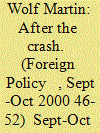

|
|
|
|
|
| Publication |
Sept-Oct 2000.
|
| Description |
46-52
|
|
|
|
|
|
|
|
|
|
|
|
|
|
|
|
| 2 |
ID:
035338
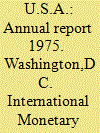

|
|
|
|
|
| Publication |
Washington,DC, International Monetary Fund., n.d..
|
| Description |
xiii,133p.
|
|
|
|
|
|
|
|
|
|
|
|
Copies: C:1/I:0,R:0,Q:0
Circulation
| Accession# | Call# | Current Location | Status | Policy | Location |
| 015906 | 332.456605/IMF 015906 | Main | Withdrawn | General | |
|
|
|
|
| 3 |
ID:
053181
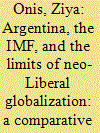

|
|
|
| 4 |
ID:
001695
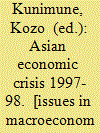

|
|
|
|
|
| Publication |
Tokyo, Institute For Developing Economies, 1999.
|
| Description |
75p.
|
|
|
|
|
|
|
|
|
|
|
|
Copies: C:1/I:0,R:0,Q:0
Circulation
| Accession# | Call# | Current Location | Status | Policy | Location |
| 041266 | 338.95/KUN 041266 | Main | On Shelf | General | |
|
|
|
|
| 5 |
ID:
145617
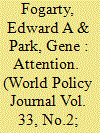

|
|
|
|
|
| Summary/Abstract |
Political scientists Edward A. Fogarty and Gene Park argue that the world’s response to the 2008 economic crisis demonstrates that, when the next global economic disaster hits, members of the G-20 will work together. Outside of crisis, the G-20 can only be expected to take baby steps toward greater coordination and fiscal transparency.
|
|
|
|
|
|
|
|
|
|
|
|
|
|
|
|
| 6 |
ID:
140609
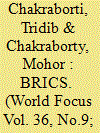

|
|
|
|
|
| Summary/Abstract |
The genesis of BRIC (Brazil-Russia-India-China, predecessor of present-day BRICS) as a multilateral grouping of the four developing or emerging economies can be traced back to September 2006, with the 61st Session of the United Nations General Assembly in New York, in a bid to explore measures of economic and political cooperation among the member-States. Officially, the organization came into existence in 2009, and with the inclusion of South Africa as the fifth member in April 2011, BRIC was re-christened BRICS. Till date, the BRICS member-states have held seven Summits and the latest in Ufa, Russia (July 2015) has been a watershed with the entry into force of the New Development Bank/BRICS Bank and the Contingent Reserves Arrangement. The BRICS Bank is heralded as an alternative to the World Bank-International Monetary Fund-led international economic architecture. However, it remains to be testified whether the BRICS Bank can evolve as a pulsating alternative to the WB-IMF-led financial system, though there is no way denying its establishment as a stepping stone for providing a predominantly South-South economic cooperative mechanism.
|
|
|
|
|
|
|
|
|
|
|
|
|
|
|
|
| 7 |
ID:
114055
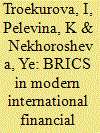

|
|
|
|
|
| Publication |
2012.
|
| Summary/Abstract |
The authors argue for the need to review state representation at the IMF. They focus on the BRICS countries that are putting in the highest growth rates and may, in the long term, have a greater influence than they do now on the way the world economy is running in its development. The authors follow progress China's yuan is making gradually in winning international acceptance.
|
|
|
|
|
|
|
|
|
|
|
|
|
|
|
|
| 8 |
ID:
089107
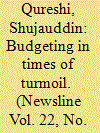

|
|
|
|
|
| Publication |
2009.
|
| Summary/Abstract |
Despite failing to meet the economic targets during the fiscal year 2008-09, the Pakistan peoples Party-led coalition government presented the Federal Budget 2009-10 on June 13, with the twin objectives to stabilise (the economy) with a human face and induce growth with equity.
|
|
|
|
|
|
|
|
|
|
|
|
|
|
|
|
| 9 |
ID:
021833
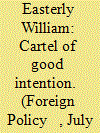

|
|
|
|
|
| Publication |
July-Aug 2002.
|
| Description |
40-49
|
|
|
|
|
|
|
|
|
|
|
|
|
|
|
|
| 10 |
ID:
064889
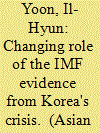

|
|
|
| 11 |
ID:
021819
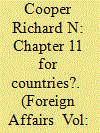

|
|
|
|
|
| Publication |
July-Aug 2002.
|
| Description |
90-103
|
|
|
|
|
|
|
|
|
|
|
|
|
|
|
|
| 12 |
ID:
123984
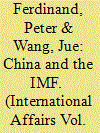

|
|
|
|
|
| Publication |
2013.
|
| Summary/Abstract |
The International Monetary Fund was the international financial institution that was most alien to the Chinese government when it embarked upon its economic reforms at the end of the 1970s, because financial markets were neglected in China's centralized plan. Therefore, China's increasing cooperation with the IMF illuminates the extent to which China has changed through 'socialization' into the norms of global governance more generally.
The article examines the evolution of China's involvement with the IMF and argues that in many respects it has embraced those norms. Even though its political economy still substantially diverges from western prescriptions, many features are compatible with the (original) 'Washington Consensus'.
But China remains wary of becoming too dependent on possible IMF assistance; it tries to preserve its freedom of manoeuvre. Although the IMF has attempted to acknowledge China's growing global importance by increasing its voting rights, this has failed to keep pace with change in the global economy. China is thus attracted by the possibility of additional ways of pragmatically increasing its leverage over global decisions, for instance through regional financial cooperation in Asia.
|
|
|
|
|
|
|
|
|
|
|
|
|
|
|
|
| 13 |
ID:
091313
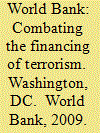

|
|
|
|
|
| Publication |
Washington, DC, World Bank, 2009.
|
| Description |
iv, 94p.
|
| Series |
Combating money laundering and the financing of terrorism: a comprehensive training guide no. 6
|
| Standard Number |
9780821375693
|
|
|
|
|
|
|
|
|
|
|
|
Copies: C:1/I:0,R:0,Q:0
Circulation
| Accession# | Call# | Current Location | Status | Policy | Location |
| 054406 | 332.10684/WOR 054406 | Main | On Shelf | General | |
|
|
|
|
| 14 |
ID:
091316
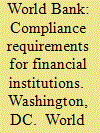

|
|
|
|
|
| Publication |
Washington, DC, World Bank, 2009.
|
| Description |
iv, 84p.
|
| Series |
Combating money laundering and the financing of terrorism: a comprehensive training guide; no. 3b
|
| Standard Number |
9780821375693
|
|
|
|
|
|
|
|
|
|
|
|
Copies: C:1/I:0,R:0,Q:0
Circulation
| Accession# | Call# | Current Location | Status | Policy | Location |
| 054403 | 332.10684/WOR 054403 | Main | On Shelf | General | |
|
|
|
|
| 15 |
ID:
072259
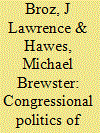

|
|
|
|
|
| Publication |
2006.
|
| Summary/Abstract |
We address the question of how international public goods are financed by analyzing voting in the U.S. Congress on legislation to increase the U.S. contribution to the International Monetary Fund (IMF). We argue that legislators are more likely to vote in favor of an increase (1) the more campaign contributions they obtain from banks that specialize in international lending, and (2) the greater the share of high-skilled "proglobalization" workers in their districts. The first argument supports the inference that a financially strong IMF mitigates the risks of international lending, to the benefit of the lending banks. The second reflects our claim that voters view the IMF as a positive force for global economic integration that-following Stolper-Samuelson reasoning-benefits high-skilled workers. Lastly, we analyze IMF loan decisions and find modest support for the claim that IMF policy reflects the interests of major international banks. Overall, our results suggest that private actors within the United States have individual stakes in funding the IMF.
|
|
|
|
|
|
|
|
|
|
|
|
|
|
|
|
| 16 |
ID:
052176
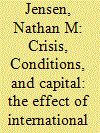

|
|
|
|
|
| Publication |
April 2004.
|
| Summary/Abstract |
A selection model for 68 countries between 1970 and 1998 is used to test the impact of International Monetary Fund(IMF) programs on international capital markets and examine how agreements are perceived by multinational investors. Results reveal that even after controlling for the factors that lead countries to seek IMF support, IMF agreements lead to lower levels of foreign direct investment (FDI). Countries that sign IMF agreements, ceteris paribus, attract 25% less FDI inflows than countries not under IMF agreements.
|
|
|
|
|
|
|
|
|
|
|
|
|
|
|
|
| 17 |
ID:
105051
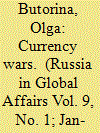

|
|
|
|
|
| Publication |
2011.
|
| Summary/Abstract |
Currency Wars
27 march 2011
Olga Butorina
Who is to Pay the Crisis Exit Fee?
Olga Butorina is a Doctor of Economics, professor, head of the European Integration Department, Advisor to the Director of the MGIMO University of the Russian Foreign Ministry, and a member of the Board of Advisors of Russia in Global Affairs.
Tags
global economy recession Leave a comment Add to blog
?????? ? ??????.?????
Text
Print
One page Page 1 of 4
Resume: The tools available to the world community to try to resolve the currency dispute between the United States and China are very limited. Under a favorable scenario the conflict will remain latent, and under the worst-case scenario it will result in the overall growth of protectionism. Much will depend on how well Western countries can reduce the level of public debt. At the second turn of the debt crisis it will go geopolitical.
See also
The reckless West
Fyodor Lukyanov
Russia's Accession to the WTO: External Implications
Alexei Portansky
When the Dust Settles
Fyodor Lukyanov
Towards a Unified Innovative Market
Vladimir Yevtushenkov
The "Third Cycle": Is Russia Heading Back to the Future?
Kirill Rogov
"Today, as in the past, when economic and financial problems worsen, they upset the social balance, undermine democracy, weaken trust in institutions, and can degenerate into war, civil or foreign…"
Dominique Strauss-Kahn, IMF Managing Director, December 8, 2010
In the 1990s the International Monetary Fund, acting on a tip from the United States, strongly recommended that countries with economies in transition should peg their exchange rates to strong and stable world currencies - in fact, the U.S. dollar. Fixed exchange rates minimized the currency risks of foreign investors and thus promoted the influx of foreign capital, especially into the countries of Southeast Asia.
|
|
|
|
|
|
|
|
|
|
|
|
|
|
|
|
| 18 |
ID:
044525
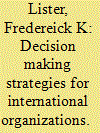

|
|
|
|
|
| Publication |
Denver Colorado, University of Denver, 1984.
|
| Description |
ix,142p.
|
| Series |
Monograph series in world affairs
|
| Standard Number |
0879400757
|
|
|
|
|
|
|
|
|
|
|
|
Copies: C:1/I:0,R:0,Q:0
Circulation
| Accession# | Call# | Current Location | Status | Policy | Location |
| 024789 | 332.152/LIS 024789 | Main | On Shelf | General | |
|
|
|
|
| 19 |
ID:
074948
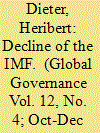

|
|
|
| 20 |
ID:
167804
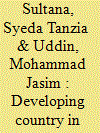

|
|
|
|
|
| Summary/Abstract |
Since the end of World War II, Bretton Woods system remains in the midst of Global Economic Governance (GEG). International Monetary Fund (IMF) was created to regulate monetary policy, International Bank for Reconstruction and Development (IBRD), then World Bank (WB) was formed to look into financial aid and lending, and General Agreement on Tariffs and Trade (GATT), then World Trade Organization (WTO) was established to regulate trade. These institutions are yet to provide much space for effective participation of developing states and are dominated by developed world like United States (US), European Union (EU), etc. Hence, a vital target of Goal 16 of Sustainable Development Goals (SDGs) is to broaden and strengthen the participation of developing states in global governance institutions. Global financial crisis and economic rise of China and India have resulted in large-scale participation of developing states in global economic governance. Being a developing country, Bangladesh will be benefitted and able to broaden its participation from exercising practices of China and India in the institutions of global economic governance.
|
|
|
|
|
|
|
|
|
|
|
|
|
|
|
|
|
|
|
|
|